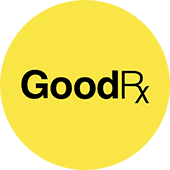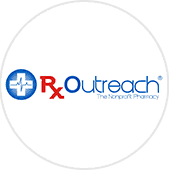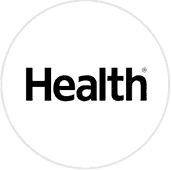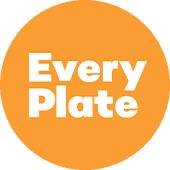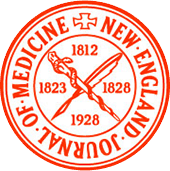7 Essential Blood Tests To Talk About With Your Doctor
Want to know how to give your doctor the ultimate snapshot of your health?

It’s all in the bloodwork! Blood tests are the easiest way for your doctor to identify underlying health issues before they escalate into serious concerns. However, blood tests are not a one-size-fits-all tool. Engaging in open dialogue with your physician is crucial to tailor blood test recommendations to your specific needs. As individuals, our medical journeys are unique. Health can be influenced by many factors, including personal medical history, family medical history, age, sex, and lifestyle. While some blood tests universally benefit everyone, others are individualized and depend upon the patient.
With the vast number of blood tests available, it’s hard to know which are worthwhile in safeguarding our health and empowering our wellness journey. Join us as we explore the seven essential blood tests that every adult should discuss with their doctor at their next health exam.
1. Comprehensive Metabolic Panel *
A Comprehensive Metabolic Panel (CMP) is a blood test that provides important information about your body’s metabolism and organ function. It typically includes a set of 14 or more blood tests that measure various substances in your blood, such as: 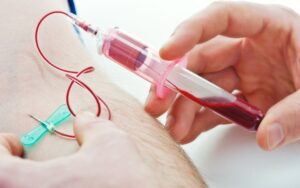
- glucose
- electrolytes
- kidney function markers
- liver enzymes
- proteins
The CMP gives your doctor a “big picture” look at your overall health, helping them assess how well your organs, such as the liver and kidneys, are functioning. This panel is routinely given at annual checkups to screen for prediabetes or blood sugar imbalances. It can also monitor chronic conditions like diabetes, liver disease, and kidney disorders or evaluate how certain medications may be affecting your body.
2. Complete Blood Count (CBC) *
Next on our list is the Complete Blood Count (CBC)–a routine blood test that provides an informative picture of your blood. It can help your doctor get a good idea of your overall health and identify any underlying issues you may be having. This is a critical test for anyone with a family history of blood disorders or someone experiencing fatigue, aches, or weakness.
3. Thyroid Panel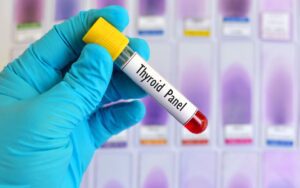
The thyroid is a small gland in your neck that can help your body function properly. It can positively or negatively affect your mood, metabolism, and energy, depending on whether or not it is functioning well. Therefore, a thyroid panel makes number three on our list of essential blood tests. A thyroid test can determine whether yours is overactive (hyperactive thyroid) or underactive (hypoactive thyroid). Anyone with a family history of thyroid problems, especially women or those with symptoms, can benefit from a thyroid test every five years.
4. Vitamin D Blood Test
Many people are at risk for Vitamin D deficiency without realizing it. We get Vitamin D through sun exposure, but it can also be supplemented and found in some fortified foods. This nutrient is essential for healthy bones and teeth, maintaining a strong immune system, improving mental health, and ensuring cardiovascular health. Unfortunately, many people are deficient in Vitamin D. People with limited exposure to the sun, who are not taking a supplement, or those with symptoms should consider a yearly Vitamin D blood test to ensure they are getting enough.
5. Prostate Screening
While this blood test is just for men, its importance was enough to make the list. It is recommended that all men have a conversation with their physician about prostate screening starting at age 45. This blood test measures the protein found in the prostate gland. Results can rule out prostate cancer, prostate inflammation, and benign prostatic hyperplasia. Early detection of these is essential for adult male wellness and longevity. Men with a family history of prostate cancer, African American men, and men with a known BRCA gene mutation are advised to begin screening as early as age 45. Retesting should occur frequently under the guidance of a physician.
6. Lipid Panel
Next on our essential seven list, every adult should consider a lipid panel as part of their routine blood work each year. A lipid panel is a group of blood tests that measure various lipids (fats) and fatty substances in the blood. The panel provides essential information about a person’s cardiovascular health by assessing the levels of different lipid components. A typical lipid panel includes measurements of both good and bad cholesterol, total cholesterol, and triglycerides. High cholesterol can lead to heart disease and stroke, which can happen to anyone, especially those with a family history.
A lipid panel is usually recommended for routine health screenings starting at age 20 and retested every 4 to 6 years. Adults at risk of heart disease or those with risk factors such as high blood pressure, diabetes, obesity, smoking, or a family history of cardiovascular disease should be tested more frequently.
7. C-reactive Protein (CRP)
Finally, the C-reactive protein test is a simple, routine blood test that looks for infection (viral or bacterial) or inflammation in the body. CRP is a protein made by your liver. If you have inflammation, it’s your body’s way of telling you there is a deeper issue. Testing can inform you of certain diseases and the risk of developing heart disease or having a heart attack. Elevated CRP levels may indicate various inflammatory conditions, such as rheumatoid arthritis, lupus, inflammatory bowel disease, infection, or tissue injury. However, the results are non-specific, so further testing and evaluation may be needed to determine the underlying cause of elevated CRP levels. If you and your doctor suspect inflammation in your body, have symptoms or an infection, or are monitoring your chronic condition, this test is crucial.
What to Expect When Getting a Blood Test
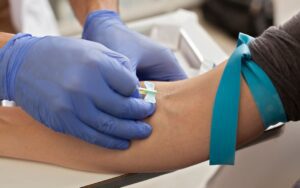 When preparing for your blood tests, it’s important to know that the frequency of tests varies. Some are annual, while others can be done every few years. In addition, specific blood tests may require fasting beforehand to ensure accurate results. You should consider scheduling those blood tests first thing in the morning. Once your blood is drawn, you should receive your test results within a few days. In the event of abnormal results, your physician may schedule a follow-up visit or recommend additional bloodwork to further investigate any potential health concerns. Don’t hesitate to schedule a follow-up appointment or phone call to review your bloodwork results in detail. Remember, staying informed and following any pre-test instructions provided by your healthcare provider can help ensure a smooth and effective blood testing experience.
When preparing for your blood tests, it’s important to know that the frequency of tests varies. Some are annual, while others can be done every few years. In addition, specific blood tests may require fasting beforehand to ensure accurate results. You should consider scheduling those blood tests first thing in the morning. Once your blood is drawn, you should receive your test results within a few days. In the event of abnormal results, your physician may schedule a follow-up visit or recommend additional bloodwork to further investigate any potential health concerns. Don’t hesitate to schedule a follow-up appointment or phone call to review your bloodwork results in detail. Remember, staying informed and following any pre-test instructions provided by your healthcare provider can help ensure a smooth and effective blood testing experience.
Final Thoughts
Ultimately, blood tests play a crucial role in preventive healthcare by aiding in the early detection of potential health issues. It’s essential to consult with your physician to determine which tests are appropriate for you and to follow up annually to monitor your health status.

At Knew Health, we prioritize your wellness and believe in the importance of preventive healthcare. That’s why we’ve made ordering essential blood tests straightforward and cost-effective. We’ve partnered with Evexxia to offer no-cost and low-cost labwork, a yearly lab allowance, and transparent pricing. Additionally, every member receives an annual wellness exam with the practitioner of their choice at no extra cost as part of their membership, ensuring comprehensive and accessible healthcare for all. Call us today or visit our website to learn more.
* Indicates labs that are no-cost for Knew Health Members
Disclaimer: This information is being provided to you for educational and informational purposes only. It is being provided to educate you about how to take care of your body and as a self-help tool for your own use so that you can reach your own health goals. It is not intended to treat or cure any specific illness and is not to replace the guidance provided by your own medical practitioner. This information will be used at your own risk based on your judgment. If you suspect you have a medical problem, we urge you to take appropriate action by seeking medical attention.
Sources
“C-Reactive Protein (CRP) Test.” Medline Plus, medlineplus.gov/lab-tests/c-reactive-protein-crp-test.
Entis, Laura. “6 Important Blood Tests.” Consumer Reports, 6 Feb. 2024, www.consumerreports.org/health/blood-test/important-blood-tests-a3698124700/.
“How Often Do I Need Routine Blood Work?” Comprehensive Primary Care, comprehensiveprimarycare.com/how-often-do-i-need-routine-blood-work/.
Jewell, Tim, and Alina Sharon. “All About Blood Tests.” Healthline, 3 Nov. 2021, www.healthline.com/health/blood-tests.
“What Blood Tests Should I Get at My Annual Physical, and What Do They Mean?” Nebraska Medicine, 30 May 2023, www.nebraskamed.com/health/questions-and-answers/what-blood-tests-should-i-get-at-my-annual-physical-and-what-do-they.
“When Should I Start Having My Cholesterol Checked?” Cleveland Clinic, 20 Jan. 2020, health.clevelandclinic.org/when-should-i-start-having-my-cholesterol-checked.






